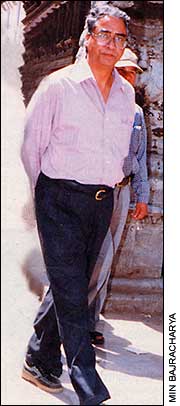 With the police chief's inner instincts and the Election Commission's interim order having cast a wider shadow on the general elections, it's time to narrow down our options. We must start the electoral process on 13 November not just to save democracy. We need to find out soon which cluster of Kangresis will eventually get the tree.
With the police chief's inner instincts and the Election Commission's interim order having cast a wider shadow on the general elections, it's time to narrow down our options. We must start the electoral process on 13 November not just to save democracy. We need to find out soon which cluster of Kangresis will eventually get the tree. The Maoists have threatened to disenfranchise voters unless something resembling a constituent assembly figures on the ballot paper. It wasn't supposed to be like this. "Politics is war without bloodshed while war is politics with bloodshed," the Great Helmsman once said. The political and military wings of our revolutionaries often have been working at cross purposes, ever since Prachanda blazed his trail two years ago. It wouldn't be prudent to count too much on any unilateral pre-election cease-fire. Since we're pressed for time, we must impress upon the rebels that free and fair elections are crucial to contemplating a new constitution.

As for the one we have, Article 127 has prompted too many questions of propriety and legitimacy. We might be best off with the restoration of the House of Representatives. We can't afford, however, to let our justices lose faith in the system by overturning their unanimous verdict. Especially since we've enshrined the bench as the ultimate arbiter of whether we can cast our ballots. Since the security forces are worried about law and order, regardless of the number of voting phases, pluralism has become a high-risk pursuit. With helicopters going missing or smouldering in rebel fire, we can't even start comprehending the logistical nightmare remote regions would confront.
So here's a better idea. Let's re-elect the entire 205 line-up unopposed. The UML and RPP seem ready to re-nominate prominent MPs any way. An across-the-board extrapolation would have a therapeutic effect on the body politic. The deceased and those who decline a second consecutive term can be succeeded by runners-up in the 1999 election. That way we'll preserve faith in ourselves as worthy custodians of the spirit of '90. We also will be spared the Khrushchevian anguish of having to listen to candidates promising to build bridges even where there are no rivers.
The next all-party conclave should unanimously reaffirm our commitment to forward-looking change by restoring the status quo ante. Be sure to invite the Deuba brigade, Praja Parishad, Hariyali Party and the other smaller outfits to make the resolution truly representative. The UML would have the most to gain. How many parties in the world can take satisfaction in having sacrificed an imminent majority for the sake of the system? This solution would also help prevent Bam Dev Gautam from exacerbating the Madhav Nepal-Khadga Oli squabbles over ticket distribution.
The Nepali Congress could get one last chance to put its house in order before the parliamentary party formally splits. The RPP might have a problem, since some leaders have just started pepping up supporters with visions of their own majority. Until a few weeks ago, the party seemed set to improve its tally in the dissolved legislature. You can't make such predictions based on the three-way split over whether to tie up with Koirala, Deuba or the UML. For many former panchas, preserving what they had might not be an entirely fatalistic proposition.
The radical communist groups, which are part of the parliamentary process to expose its fraudulence, should have the least objection. Parties hoping to make their debut in the Lower House will have enough time to improve their chances in the next polls. Independents could make gains in a normal election, but it would be difficult for them to stay that way in the post-9/11 you're-either-with-us-or-against-us global environment.
The prospect of another parliamentary cycle could encourage the Maoists to reconsider their priorities. With enough prodding, the political commissars might be able to persuade the military commanders to let the people decide. Not that the Maoists' acquiescence would animate everyone. Many Nepalis remain convinced that the people who count the votes end up deciding everything. The good thing about us is that we still bother to vote. The turnout in both Rastriya Panchayat elections in the 1980s was impressive, even though the outcome in most constituencies was already known. Wouldn't it be nice to know the exact composition of the next House minutes after the last nomination papers have been filed?


